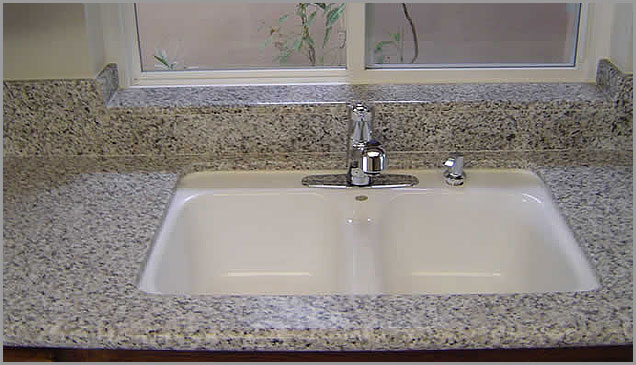Honed Granite
Why Honed Granite Is So Special
Granite is available in at least three different surface finishes – polished, satin and honed. A honed finish is
made by stopping the finishing process exactly before the granite surface achieves a high gloss finish.
The surface of honed granite therefore has a different appearance than polished granite. It has a matte-like
appearance that is softer and more subdued with little or no reflection of light. This appearance has a certain
appeal to homeowners who are not very fond of the high mirror finish of polished stone. Homes with rustic or
informal kitchen settings will be ideal for this type of granite finish.
Honed granite is also appropriate for floors and walkways where you don’t want a shiny and slippery finish. In
fact, granite floors with honed finish are not slippery even when wet. In addition, due to its matte-finish, there
is no depth of color which is very functional for floors and walkways. Another popular use for honed granite is the
home kitchen. Its soft and muted appearance, its natural beauty and strength, plus its ease of maintenance are some
of the reasons why it is popular for kitchen countertops.
Advantages of Honed Granite
With its flat finish, honed granite is advantageous to
homeowners who prefer a rustic, aged, farmhouse or old world image for their kitchens. They are also attractive to
those who do not want the formal look of polished granite. Honed granite is ideal for homeowners who want a subdued
ambience in their kitchens. Their surfaces have no loud colors, no dramatic vein movements which projects an image
of softness and smoothness.
Some honed granite finishes such as those made of Absolute Black Granite do not require sealing. Other light
colored granite and marble will not require regular maintenance when honed.
Disadvantages of Honed Granite
Natural fissures, pits and other stone marks are not hidden
in honed granite. These imperfections are usually hidden when you bring the granite surface to a high polish. Since
a honed surface is not highly polished, these stone marks can be easily seen. Make sure that the granite you will
buy has even texture and does not have these small pits and fissures.
Because of its unpolished surface, honed granite is harder to clean. Moisture like water and oil deposited on
its surface will make it look polished temporarily. Depending on the color of your countertop, oil stains, liquid
and fingerprints will be very noticeable because of the dark area it will create. You can avoid this appearance by
wiping the stains or marks as soon as you see them.
 Care And Maintenance Care And Maintenance
Due to its matte-finish, honed granite can
easily develop stains if you don’t take care of it properly. Here are some information about the care and
maintenance of honed granite. This will help protect their surfaces.
• In cleaning the countertop, avoid using cleansers that contain acids, alkalis, bleaches and harsh chemicals.
Never use steel wool or hard-bristled brushes. Use warm water, mild soap, natural stone cleansers and soft,
non-abrasive cloth.
• Daily Care – Wipe off dirt, food wastes after every food preparation. After you’re through using your
countertop for the day, wipe the countertop with a soft cloth dipped in warm water with natural stone cleanser. If
food or dirt has dried in the surface, carefully scrape them off with a spoon then wipe it dry with a soft cloth.
Granite is not easily scratched so don’t worry about damaging the stone.
• Weekly Maintenance – Schedule a total washing of your countertop once a week. Use water and mild soap or a
natural stone cleanser. For stubborn dirt, you can use a brush with soft bristles. Use warm water to rinse the
counter, then wipe it dry.
• In removing stains, using a poultice will help a lot. You can mix a poultice yourself to save on costs.
Using a bowl, mix ½ cup of baking soda with enough warm water to a paste. Mix it until it has the consistency of a
thick paste. Then spread the paste over the stain and cover it with a plastic wrap. You can secure it with a
masking tape. Let the paste work with the stain overnight. Then remove the paste with a putty knife. Rinse the
surface with warm water and wipe dry.
• Periodic Sealing – honed granite is highly porous therefore you need to reseal it every 6 months or so. You
can buy a natural stone sealer from any hardware or home improvement store. Apply the sealer with long smooth
strokes using a soft cloth. Spreading the sealant lightly will facilitate its absorption. Allow sufficient time for
the first coat to dry before applying the second coating.
|  Care And Maintenance
Care And Maintenance